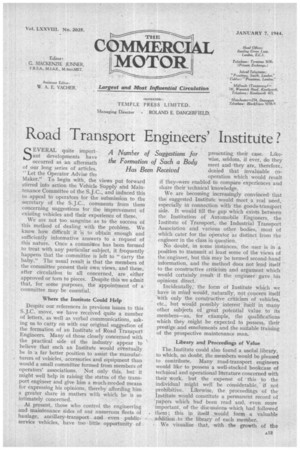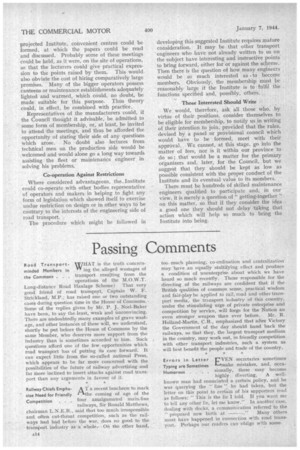Road Transport Engineers' institute?
Page 15

Page 16

If you've noticed an error in this article please click here to report it so we can fix it.
EVERAL quite import ant developments have occurred as an aftermath of our long series of articles, "Let the Operator Advise the Maker." To begin with, the views put forward stirred into action. the Vehicle Supply and Maintenance Committee of the S.J.C., and induced this to appeal to operators for the submission to the secretary of the S. J.C., comments from them concerning suggestions for the improvement of existing vehicles and their experience of these.
We are not too sanguine as to the success of this method of dealing with the problem. We know how difficult it is to obtain enough and sufficiently informative answers to a request of this nature. Once a committee has been formed to treat with any particular subject, it frequently happens that the committee is left to " carry the baby.". The usual result is that the members of the commit-tee present their own views, and these, after circulation to all concerned, are either approved or torn to pieces. Despite this we admit that, for some purposes, the appointment of a committee may be essential.
Where the Institute Could Help, Despite our references in previous issues to this S.J.C. move, we have received quite a number of letters, as well as verbal communications, asking us to carry on with our original suggestion of the formation of an Institute of Road Transport Engineers. Many of those closely concerned with the practical side of the industry appear to believe that such an Institute would eventually be in 'a far better position to assist the manufacturers of vehicles, -accessories and equipment than would a small committee formed from members .of operators' associations. Not only this, but it might well help in raising the status of the transport engineer and give him a much-needed means for expressing his opinions, thereby affording him a greater share in matters with which he is so intimately concerned.
At present, those who control the engineering and maintenance sides of our numerous fleets of haulage, ancillary-transport and even publicservice vehicles, have too little opportunity of presenting their case. Likewise, seldom, if ever, do they meet and 'they are, therefore, denied that invaluable cooperation which would result if they -were enabled to compare experiences and share their techniCal knowledge.
We are becoming increasingly convinced that the suggested Institute would meet a real need, especially in connection with the goodsLtransport side. It would till the gap which exists between the Institution of Automobile Engineers, the Institute of Transport, the Industrial Transport Association and various other bodies, most Of . which cater for the operator as distinct from the engineer in the class in question.
No doubt, in some instances, the user is in a position to transmit at least some of the views of the engineer, but this may be termed second-hand information, and the Method does not lend itself to the constructive criticism and arguritent vvhich would certainly result if the engineer gave, his opinions direct.
Incidentally; the form of Institute which we have in mind would, naturally, not concern itself tvith only the constructive criticism of vehicles, etc., but would possibly interest' itself in many other subjects of great potential value, toits members—as, for ekample, the qualifications which they might be expected to possess, their prestige and emoluments and the suitable training of the prospective maintenance man.
Library and Proceedings of Value The Institute could also found a useful library, to Which, no doubt; the members would be pleased to contribute. Many road-transport engineers would like to possess a well-stocked bookcase of technical and operational literature concerned with their work, but the expense of • this to the individual might well be considerable,' if not prohibitive. Likewise, the proceedings of the Institute would constitute a permanent record of papers which had been read and, even more important, of the discussions which had followed them ; this in itself Would form a valuable addition to the library of each member. We visualize that, -with the growth of the A13 projected Institute, convenient centres could be formed, at which the papers could be read and discussed. Probably some of these meetings could be held, as it were, on the site of operations, so that the lecturers could give practical expression to the points raised by them. This would also obviate the cost of hiring comparatively large premises. Many of the bigger operators possess canteens or maintenance establishments adequately lighted and warmed, which could, no doubt, be made suitable for this purpose. Thus theory could, in effect, be combined with practice.
Representatives of the manufacturers could, if the Council thought it advisable, be admitted to • some form of membership, or, at least, be invited to attend the meetings, and thus be afforded the opportunity of stating their side of any questians which arose. No doubt also lectures from technical men on the production side would be wekomed and would• alone go a long way towards assisting the fleet or maintenance engineer in solving his problems.
Co-operation Against Restrictions Where considered advantageous, the .Institute could co-operate with other bodies representative of operators and makers in helping to fight any form of legislation which showed itself to exercise undue restriction on design or in other ways to be contrary to the interests of the engineering side of road transport.
The procedure which might be followed in developing this suggested Institute requires mature consideration. It may be that other transport engineers who have not already written to us on the subject have interesting and instructive points to bring forward, either for or against the scheme. Then there is the question of how many engineers would be so much interested as to become members. Obviously, the membership rausi he reasonably large if the Institute is to fulfil the functions specified and, possibly, others.
Those Interested Should Write We would, therefore, ask all those who, by virtue of their positions, consider themselves to be eligible for membership, to notify us in writing of their intention to join, provided that the rules, devised by a panel or provisional council which would have to be formed, meet with their approval. We cannot, at this stage, go into the matter of fees, nor is it within our province to do so ; that would be a matter for the primary organizers and, later, for the Council, but we suggest that they should be kept as low as possible consistent with the proper conduct of the Institute and its eventual value to its members.
There must be hundreds of skilled maintenance engineers qualified to participate and, in our view, it is merely a question of " getting-together " on this matter, so that if they consider the idea a good one they should not delay taking that action which will help so much to bring the Institute into being.




















































